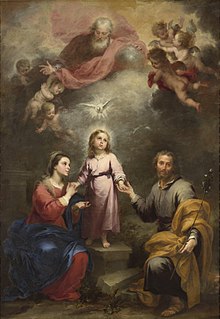
Back سر التجسد Arabic تجسد ARZ Боговъплъщение Bulgarian অবতার (খ্রিস্টধর্ম) Bengali/Bangla Encarnació de Crist Catalan Vtělení (křesťanství) Czech Menschwerdung Gottes German Ενσάρκωση (Χριστιανισμός) Greek Enkarniĝo (kristanismo) Esperanto Gizakunde Basque


| Part of a series on |
| Christology |
|---|
In Christian theology, the doctrine of incarnation teaches that the pre-existent divine person of Jesus Christ, God the Son, the second person of the Trinity, and the eternally begotten Logos (Koine Greek for "word"), "was made flesh"[1] by being conceived in the womb of a woman, the Virgin Mary, also known as the Theotokos (Greek for "God-bearer" or "Mother of God"). The doctrine of the incarnation then entails that Jesus was at the same time both fully God and fully human.[2]
In the incarnation, as traditionally defined by those Churches that adhere to the Council of Chalcedon, the divine nature of the Son was united but not mixed with human nature[3] in one divine person, Jesus. This is central to the traditional faith held by most Christians. Alternative views on the subject (see Ebionites and the Gospel of the Hebrews) have been proposed throughout the centuries, but all were rejected by Nicene Christianity.
The incarnation is commemorated and celebrated each year at Christmas, and reference can also be made to the Feast of the Annunciation; "different aspects of the mystery of the incarnation" are celebrated at Christmas and the Annunciation.[4]
- ^ McKim, Donald K. 1996. Westminster dictionary of theological terms. Louisville, Kentucky: Westminster John Knox Press. p. 140.
- ^ Cite error: The named reference
:0was invoked but never defined (see the help page). - ^ "Thomas Aquinas, "Of the Incarnation as part of the Fitness of Things", Jacques Maritain Center, University of Notre Dame". Archived from the original on 2015-06-22. Retrieved 2008-07-28.
- ^ "Advent Prayer and the Incarnation | EWTN". EWTN Global Catholic Television Network. Retrieved December 22, 2021.